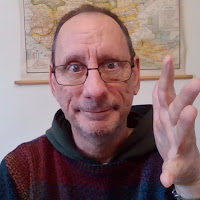One of the functions of religion is to present to us an ideal of human life toward which we may aspire. In Christianity, the ideal is the Saint. In Buddhism, it’s the Bodhisattva. The Daoist ideal is usually translated “sage.” The Jewish ideal? In Yiddish-connected Judaism, I suppose it would be the Mensch.
Can you be a Saint/Sage/Bodhisattva/Mensch? You can try. You can make it your conscious aspiration every day. It may seem like an unattainable ideal, but the path of the Saint is not about attaining anything. Or, rather, the path IS the attainment. And what is this path? It is the path of peace, of justice, of transformative love.
All you need is the aspiration to put others first. And it helps to have trusty guides. This week, I share with you some guidance from bell hooks. She writes:
To work for peace and justice we begin with the individual practice of love, because it is there that we can experience firsthand love’s transformative power. Attending to the damaging impact of abuse in many of our childhoods helps us cultivate the mind of love. Abuse is always about lovelessness, and if we grow into our adult years without knowing how to love, how then can we create social movements that will end domination, exploitation, and oppression?The path of the Saint/Sage/Bodhisattva/Mensch is the path of love.
To begin the practice of love we must slow down and be still enough to bear witness in the present moment. If we accept that love is a combination of care, commitment, knowledge, responsibility, respect, and trust, we can then be guided by this understanding. We can use these skillful means as a map in our daily life to determine right action.
When we cultivate the mind of love, we are, as Sharon Salzberg says, “cultivating the good,” and that means “recovering the incandescent power of love that is present as a potential in all of us” and using “the tools of spiritual practice to sustain our real, moment-to-moment experience of that vision.”
To be transformed by the practice of love is to be born again, to experience spiritual renewal. What I witness daily is the longing for that renewal and the fear that our lives will be changed utterly if we choose love. That fear paralyzes. It leaves us stuck in the place of suffering.
When we commit to love in our daily life, habits are shattered. Because we no longer are playing by the safe rules of the status quo, love moves us to a new ground of being. We are necessarily working to end domination. This movement is what most people fear. If we are to galvanize the collective longing for spiritual well-being that is found in the practice of love, we must be more willing to identify the forms that longing will take in daily life.
Folks need to know the ways we change and are changed when we love. It is only by bearing concrete witness to love’s transformative power in our daily lives that we can assure those who are fearful that commitment to love will be redemptive, a way to experience salvation.
Yours in the faith we share,
Meredith
Join a Journey Group: http://cucwp.org/journey-groups
I.C.Y.M.I. (In Case You Missed It)
The May 1 Service, "Beltane":
The May 8 Service, "R.E. Sunday: Gather to Grow":
Here it is, your...
MOMENT OF ZEN
#120: Where Are They?
Sixty-one episodes ago, in #59, Gray Wolf asked Brown Bear about dedicating sutras to the enlightenment of bushes and grasses.
It is not difficult to mouth the words, "all things are myself." But do you remember it when asked where the trees are?
Saying it is one thing, showing it is another, knowing that you are showing it regardless is another.
Case
One evening Owl said, "When Brown Bear visited us, Gray Wolf asked her about the dedication of our sutras to the enlightenment of bushes and grasses. Brown Bear said, 'They are very patient.' I've been musing about this for a long time, and I still don't know what to make of it."Verse
Raven asked, "Where are they?"
Owl said, "Bushes and grasses? All around."
Raven said, "Like the moon and birds."
Owl said, "Stones and clouds."
Raven said, "Very good. Now, where are they?"
Owl hooted.
Raven said, "Yes! Yes! On that path."
The old man in the forest hut,
A dozen kilometers from the nearest road, which is dirt,
And about the same to a power line, or another building,
Lives on nuts and berries, which he cans,
And the occasional package sent by a religious order
To a P.O. box, which he visits when the post office is closed.
Six years without seeing up close a face,
or hearing a voice, of another human.
Beneath the hackberry whose bloom petals mottle his roof
There are no hermits.
Case adapted from Robert Aitken; introduction and verse by Meredith Garmon
PREVIOUS ☙ NEXT ☙ INDEX



No comments:
Post a Comment